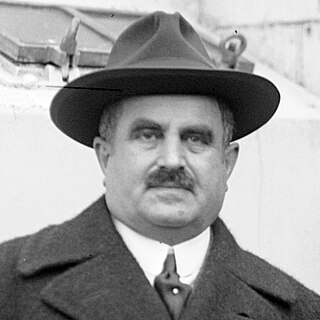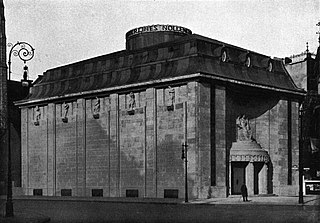Related Research Articles

The film industry in Germany can be traced back to the late 19th century. German cinema made major technical and artistic contributions to early film, broadcasting and television technology. Babelsberg became a household synonym for the early 20th century film industry in Europe, similar to Hollywood later. Early German and German-speaking filmmakers and actors heavily contributed to early Hollywood.
UFA GmbH, shortened to UFA, is a film and television production company that unites all production activities of the media conglomerate Bertelsmann in Germany. The original UFA was established as Universum-Film Aktiengesellschaft on December 18, 1917, as a direct response to foreign competition in film and propaganda. UFA was founded by a consortium headed by Emil Georg von Stauß, a former Deutsche Bank board member. In March 1927, Alfred Hugenberg, an influential German media entrepreneur and later Minister of the Economy and Minister of Agriculture and Nutrition in Adolf Hitler's cabinet, purchased UFA and transferred ownership of it to the Nazi Party in 1933.

Nazism made extensive use of the cinema throughout its history. Though it was a relatively new technology, the Nazi Party established a film department soon after it rose to power in Germany. Both Adolf Hitler and his propaganda minister, Joseph Goebbels, used the many Nazi films to promote the party ideology and show their influence in the burgeoning art form, which was an object of personal fascination for Hitler. The Nazis valued film as a propaganda instrument of enormous power, courting the masses by means of slogans that were aimed directly at the instincts and emotions of the people. The Department of Film also used the economic power of German moviegoers to influence the international film market. This resulted in almost all Hollywood producers censoring films critical of Nazism during the 1930s, as well as showing news shorts produced by the Nazis in American theaters.
Bavaria Film is a German film production and distribution company that is located in Grünwald, Bavaria at the district of Munich. It is one of Europe's largest film production companies and one of the leading production and distribution companies in the German film and television industry service, with some 30 subsidiaries.
The Tri-Ergon sound-on-film system was developed from around 1919 by three German inventors, Josef Engl (1893–1942), Joseph Massolle (1889–1957), and Hans Vogt (1890–1979).

Erich Pommer was a German-born film producer and executive. Pommer was perhaps the most powerful person in the German and European film industries in the 1920s and early 1930s.

Die Deutsche Wochenschau is the title of the unified newsreel series released in the cinemas of Nazi Germany from June 1940 until the end of World War II, with the final edition issued on 22 March 1945. The co-ordinated newsreel production was set up as a vital instrument for the mass distribution of Nazi propaganda at war. Today the preserved Wochenschau short films make up a significant part of the audiovisual records of the Nazi era.
Fritz Arno Wagner is considered one of the most acclaimed German cinematographers from the 1920s to the 1950s. He played a key role in the Expressionist film movement during the Weimar period and is perhaps best known for excelling "in the portrayal of horror," according to noted film critic Lotte H. Eisner.
Women Are Better Diplomats is a 1941 German musical comedy film from the Nazi era. Directed by Georg Jacoby and starring Marika Rökk, Willy Fritsch and Aribert Wäscher. It was based on a novel by Hans Flemming. The film was the first German feature film to be made in colour, and was one of the most expensive films produced during the Third Reich. The film met with a positive public response and was among the most popular German films of the early war years.
Nations were new to cinema and its capability to spread and influence mass sentiment at the start of World War I. The early years of the war were experimental in regard to using films as a propaganda tool, but eventually became a central instrument for what George Mosse has called the "nationalization of the masses" as nations learned to manipulate emotions to mobilize the people for a national cause against the imagined or real enemy.

Paul Davidson was a German film producer.

Ellen Richter was an Austrian-Jewish film actress of the silent era. She was married to Willi Wolff, who directed many of her films. Ellen Richter composed her own production company to create her films. She worked primarily in Germany and was one of the foremost actresses of Weimar cinema.
Jules Greenbaum was a German pioneering film producer. He founded the production companies Deutsche Bioscope, Deutsche Vitascope and Greenbaum-Film and was a dominant figure in German cinema in the years before the First World War. He is also known for his early experiments with sound films around twenty years before the success of The Jazz Singer made them a more established feature of cinema.
Messter Film was a German film production company which operated during the silent era. It was founded by the German film pioneer Oskar Messter who already owned a chain of cinemas. It was based in Berlin which had emerged as the centre of the German film industry. Messter quickly established itself as dominant force in German production, particularly during the boom years of the First World War when foreign films faced many restrictions in Germany. Messter played a prominent role in the development of the German feature film, moving away from the shorter running times which had been standard in the early years of cinema. Messter also produced its own newsreels.
Dr. Hart's Diary is a 1917 German silent war film directed by Paul Leni and starring Heinrich Schroth, Käthe Haack and Dagny Servaes. The film depicts a German field hospital in occupied Russian Poland during the ongoing First World War.

The Ufa-Pavillon am Nollendorfplatz was a cinema located at 4 Nollendorfplatz, Schöneberg, Berlin. The chief architect was Oskar Kaufmann. Built in 1912–13 and decorated by leading artistic practitioners of the day, it was the German capital's first purpose-built, free-standing cinema Described as "historically, [...] the most important cinema in Berlin", it incorporated a number of technical innovations such as an opening roof and a daylight projection screen, and opened as the Nollendorf-Theater in March 1913.
Deulig Film or Deutsche Lichtbild-Gesellschaft was a German film production and distribution company. It was established in 1916 by the German business tycoon and media mogul Alfred Hugenberg. The company's foundation, during the First World War, was intended to promote Germany's military cause but it also supported the commercial interests of several major industrial companies who backed the enterprise.

The Tempelhof Studios are a film studio located in Tempelhof in the German capital of Berlin. They were founded in 1912, during the silent era, by German film pioneer Alfred Duskes, who built a glass-roofed studio on the site with financial backing from the French company Pathé. The producer Paul Davidson's PAGU then took control and constructed a grander structure. The First World War propaganda drama The Yellow Passport, the historical comedy Madame DuBarry and the expressionist 1920 silent film The Golem were made there by PAGU.

The Weissensee Studios was a collection of separate film production studios located in the Berlin suburb of Weißensee during the silent era.
Decla-Film was a German film production and distribution company of the silent era, founded by Erich Pommer and Fritz Holz in February 1915.